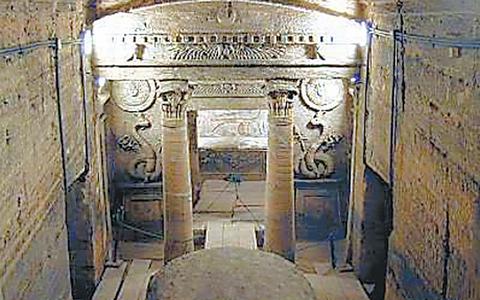Pictures: www.ethnos.gr
If what a group of archaeologists from the Polish Archaeological Centre claims is true, we are on the verge of the greatest archaeological discovery: the tomb of Alexander of Macedonia in Alexandria, Egypt, where all ancient sources locate it.
The group, which is examining the crypt of an ancient Christian church, has discovered a mausoleum made of marble and gold which could be the lost tomb of Alexander. It is located in an area known as Kom el Dick in the heart of the city centre, only 60 metres from Nebi Daniel Mosque, where the tomb is located, according to the Arab tradition.
The results of studies by the Polish group include a broken crystal sarcophagus which was damaged by a raid during the political turmoil in Alexandria during the reign of Emperor Aurelius shortly after 270 BC.

An analysis of the age of the bones found in the mausoleum is underway. The 37 bones are also broken or damaged in most parts and are clearly of two elderly men. The radiocarbon analysis will determine the age and a number of other tests will be made in order to determine whether the bones could be of the Macedonian king. There are a small number of objects dating mainly from the time of the Ptolemaic dynasty and the Romans (it is noted that the body of the deceased is placed in a crystal sarcophagus, after one of the kings of the Ptolemaic dynasty stole the original gold coffin).
140 unsuccessful attempts
The Egyptian Supreme Council of Antiquities lists more than 140 unsuccessful attempts for the discovery of the tomb, which was built by Ptolemy Philadelphus in 280 BC.
A famous place of pilgrimage in antiquity, the place is known mainly because many Roman emperors have visited it, including Julius Caesar and Augustus.
The location of the tomb was known until the 4th century AD, according to some of the first church fathers.
The monument was sealed and hidden in the 3rd and 4th century AD., in order to protect it from the Christians after the change of the official religion of the Roman Empire.
It was lost during political disturbances in Alexandria in the late 4th century and since then its location has been unknown.
This new discovery of the Poles could be one of the most important in the country.